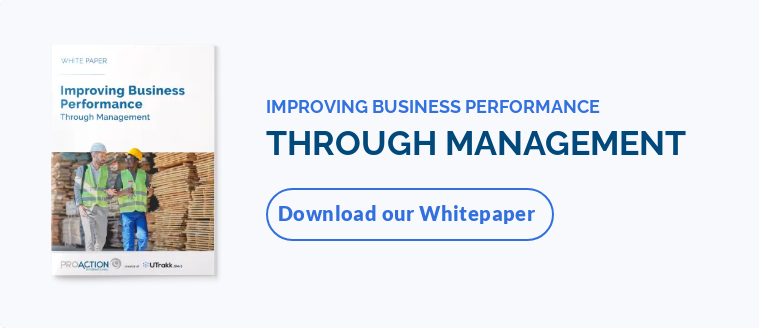What is a frontline manager, and what is his role in the company?
Frontline leaders (or first level managers) are the people in charge of a business unit, ensuring that it runs smoothly on a day-to-day basis. They are often the organization's largest population of leaders. On the one hand, they act as a bridge between upper management (middle and upper management) and frontline employees. On the other hand, they focus on team management and worker relations. For example, frontline managers may be foremen/women, supervisors, or office managers.
According to the Harvard Business Review, frontline managers make up roughly 60% of a company's management ranks. A substantial figure that shows the importance of these players.
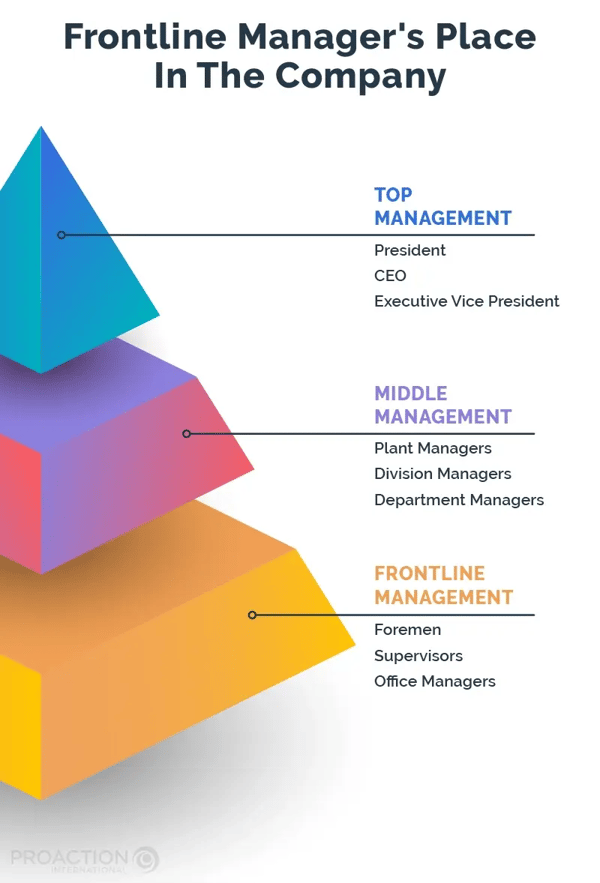
Here are the main responsibilities of frontline leaders:
Representing the team
First-line managers represent their teams in dealings with management and other departments. In many cases, they communicate the needs, concerns, and ideas of those they manage and defend their interests.
Coordinate daily operations and implement organizational strategies
The middle manager plans their team's operational activities (objectives, priorities, tasks to be performed). They must also find and distribute the resources needed to carry out these daily operations.
Coaching and supporting the workforce
The middle manager is typically responsible for guiding and supporting staff members. They ensure the staff has the resources to carry out their daily operations and achieve their objectives.
Frontline leaders play a key role in team communication. They facilitate exchanges between staff members, encourage open discussion, and ensure that messages are passed on between the employees they supervise and management.
They must practice two-way communication to escalate problems on the floor or any employee requests to management. They also drive down corporate priorities by ensuring that employees apply them daily.
Developing new skills
New skills development is key. Here, the frontline manager's role is to identify each team member's strengths and weaknesses. They must be able to offer training and professional development opportunities to encourage growth and progression. In this way, frontline employees can reach their full potential and perform more effectively.
Giving feedback
Frontline managers regularly provide constructive feedback to their employees. They recognize their successes, encourage them to improve their performance, and help them identify areas where they can improve. Feedback is given in an objective, respectful, and development-oriented way.
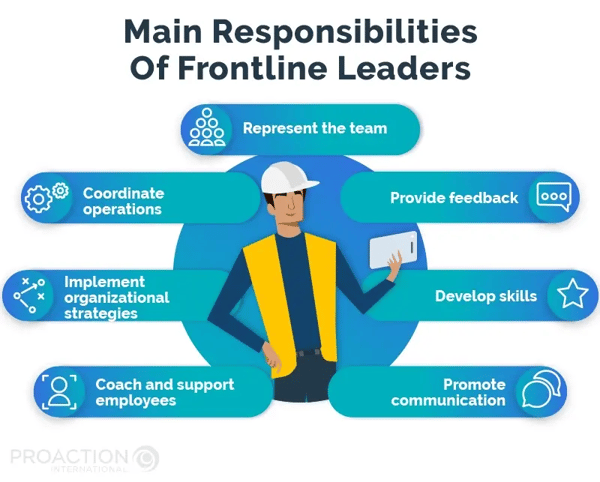
What are the main frontline leadership skills?
A good frontline manager must possess several practical skills to succeed in their role.
Good communication skills
Communication is a very important aspect of the frontline manager role. They need to know how to listen, ask pertinent questions, clarify information, and express their ideas clearly. Caring, open, and transparent communication will foster trust and mutual respect within the staff.
Demonstrate empathy and active listening skills.
A good frontline manager must understand and put themselves in their employees' shoes. They must demonstrate emotional intelligence, paying attention to their team's needs, concerns, and points of view. Active listening helps to strengthen relationships and facilitate communication between the various stakeholders.
Being an inspiring leader
The frontline manager is an inspiring and motivating leader. They create a positive work environment where the workforce feels valued and supported in their efforts. They encourage individual employees to take on challenges, take the initiative, exceed expectations, or put in extra effort.
Problem-solving skills
The frontline manager also plays the role of mediator in the sense that they are primarily responsible for effectively resolving conflicts or problems within their team. They must therefore be able to make informed decisions, find creative solutions, and manage critical situations fairly and objectively.
Demonstrate flexibility and adaptability
A frontline manager must be able to adapt to the changing needs of their team and the organization. They must be flexible in their management, remaining open to new ideas and ready to adjust their approach according to circumstances. They must also be able to guide their team through change, make courageous decisions, and create an environment conducive to innovation.
Integrity and ethics
A frontline manager must demonstrate integrity and ethics in all their actions. They are a model of good professional behavior. They respect the values and standards of both the organization and their employees.
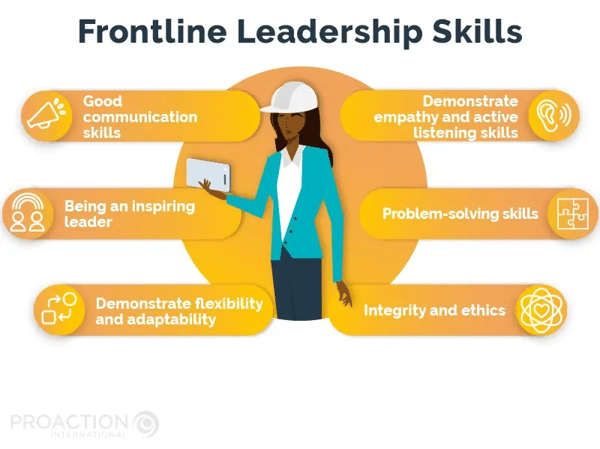
Why implement frontline management?
Frontline managers bring many benefits to the company. Firstly, it significantly improves employee well-being since they feel valued and listened to, boosting their commitment and job satisfaction.
Secondly, it has a very positive impact on productivity. Satisfied employees mean productive employees. The bond of trust between the manager and their team members facilitates collaboration and boosts motivation, thereby greatly improving the team's overall performance.
Last but not least, this bond we're talking about, this closeness and positive work environment, also contributes to a sharp reduction in staff turnover, offering much better talent retention.
A manager's role is far more than supervisory. 70% of a team's engagement is influenced by managers. (Gallup - Global Consulting and Analysis Company)
The frontline manager in the manufacturing industry
In the manufacturing sector, frontline managers play a central role, operating directly on the factory floor. They must supervise daily activities and efficiently coordinate workflows among their many tasks. They are also responsible for ensuring that manufacturing operations run smoothly, that targets are met, and that products meet the highest standards.
Another key point is that frontline leaders must have clear, well-structured management routines on the shop floor. Their work must be standardized to create a stable and productive working environment, lead teams more effectively, and foster a culture of accountability. In this way, they can fully contribute to optimizing operational performance by combining efficiency, product and service quality, and customer satisfaction.
Frontline managers and teleworking
Regarding teleworking, the role of frontline managers is extremely important. Remote employees are often isolated from their colleagues and cut off from the traditional work environment. Despite this physical distance, frontline managers will have to act on several levels:
- Maintain connection, communication, and coordination within the team.
- Ensure that employees feel supported, engaged, and involved.
This involves setting up effective communication channels, organizing regular online meetings via different platforms, providing continuous feedback, and monitoring tasks and projects closely.
Frontline managers must also be sensitive to employees' flexibility and work-life balance management needs. By positioning themself as accessible and understanding leaders, they can continue to keep employees engaged and productive, even from a distance.
7 best practices for frontline leaders
Here are some best practices to follow if you want to become an effective frontline manager:
1) Cultivate trust
Trust is important. As a frontline manager, you must be transparent, honest, and reliable in your employees' actions and words. Create an environment where employees feel comfortable sharing ideas and concerns without fear of reprisal.
2) Set clear objectives
Get together with your team members to define clear, measurable, and achievable objectives. Make sure these objectives are aligned with those of the organization.
3) Encourage personal and professional development
Identify your employees' professional development needs and offer them training opportunities, stimulating challenges, interesting projects, and increased responsibilities.
4) Communicate effectively
Open communication is key. Be accessible, listen to your employees, give them regular and constructive feedback, and share relevant information.
5) Foster collaboration
Encourage cooperation between your team members. Create opportunities for them to work together, share knowledge, and collaborate on common projects. Create a work environment where everyone feels valued and where new ideas are always welcome.
6) Include employees in decision-making
Involve your employees in the decision-making processes that concern them. Solicit their opinions when dedeveveloping strategies, action plans, or organizational changes to reinforce their sense of belonging and commitment.
7) Develop mentoring relationships
Encourage mentoring and coaching within your team members. Encourage senior employees to share their knowledge and guide those with a little less experience. It's a good way of developing skills and passing on knowledge. The frontline manager can also adopt a coaching posture with their colleagues to support them better and help them to excel.
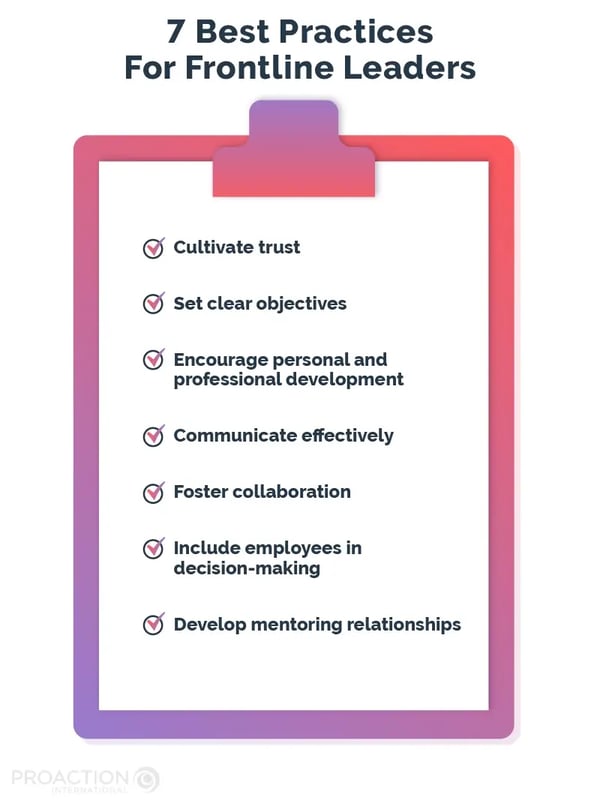
Frontline managers: promoting performance, collaboration and employee satisfaction
Frontline managers are essential to a company’s business strategy. By emphasizing open communication, skills development, recognition, and collaboration, this type of management enables leaders to build strong relationships with their teams and thus significantly increase employee motivation and productivity.
Why frontline leadership training is crucial
But an update is in order. Overlooked in many organizations, this 4.0 manager is a major link. To ensure its success and enable it to play its full role, to anticipate Industry 5.0, it is vital that this key manager receives the necessary support and frontline leadership training and coaching. Companies must therefore recognize their importance and invest in developing their managers' skills to create healthy working environments conducive to performance, innovation, and employee fulfillment.
In the same way that superheroes draw their powers from their costume, or astronauts need their suit to go into space safely, the 4.0 manager too must have his equipment to play his coaching role and multiply his strengths tenfold."
- Jean-Philippe Raiche (Partner, Strategy, and Development)






